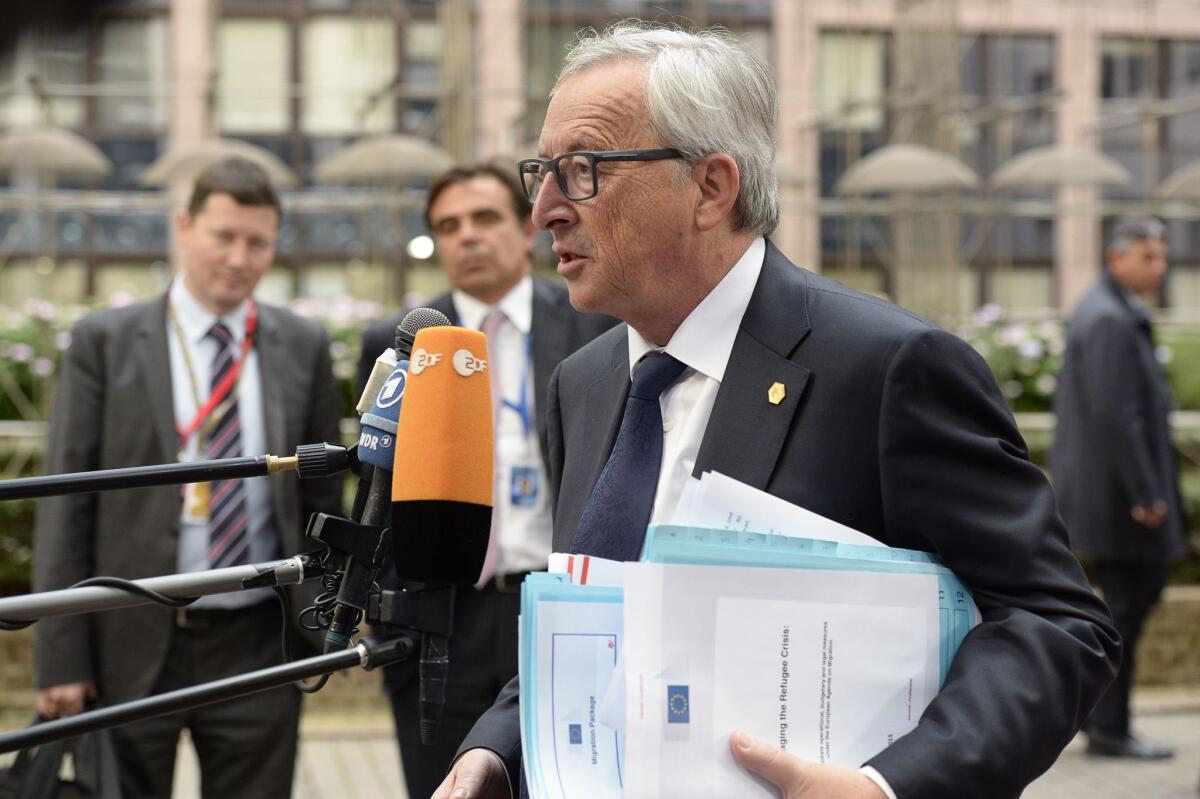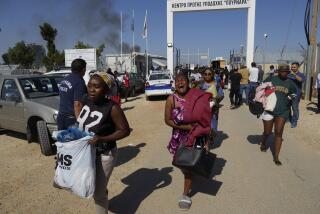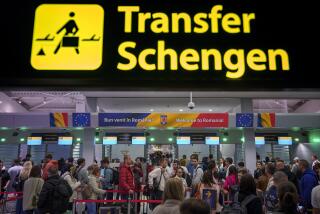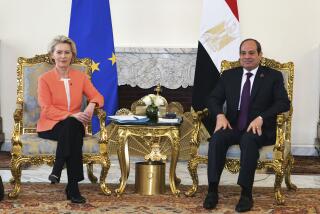European Union leaders agree on measures to alleviate migrant crisis

European Commission President Jean-Claude Juncker arrives for a European Union emergency summit on the migration crisis at EU Headquarters in Brussels.
European Union leaders tried to restore some integrity to their group’s name by agreeing early Thursday on new measures to alleviate the continent’s migrant crisis despite deep rifts that have opened up between member nations.
After weeks of name-calling and finger-pointing, the heads of government of the 28 EU countries pledged more than $1 billion toward improving conditions at camps for Syrian refugees in the Middle East, to discourage them from setting out for Europe.
The leaders also agreed to work on better securing the bloc’s perimeter and setting up EU-administered facilities in front-line countries such as Greece and Italy to register and fingerprint new arrivals.
The emergency summit in Brussels lasted nearly seven hours and was conducted in a “better than expected atmosphere,” European Commission President Jean-Claude Juncker said.
But rancor remained over a contentious proposal to resettle 120,000 refugees across the continent, barely a quarter of the total number of asylum seekers who have already crossed into Europe this year. The plan was approved Tuesday by EU government ministers through a rare majority vote rather than the usual consensus, over the angry objections of four Eastern European countries.
Prime Minister Robert Fico of Slovakia has openly vowed to resist the plan, though EU law requires compliance.
“We won’t implement this decision because we think it can’t work,” Fico said Wednesday before the summit. “We always rejected it as nonsense.”
Such defiance elicited a blunt rejoinder from President Francois Hollande of France, one of the EU’s founding nations.
“Those who don’t share our values, those who don’t even want to respect those principles, need to start asking themselves questions about their place in the European Union,” Hollande said.
The sharp words illustrate the tension that the migrant crisis has unleashed and that threatens to unravel some of the EU’s most significant achievements, such as free movement across borders. In the last few weeks, several countries, including Germany and Hungary, have reintroduced border controls to try to check the influx of asylum seekers.
The flow of people seems unstoppable. As many as 6,000 people from Syria, Afghanistan, Iraq and other war-torn nations are landing every day on several Greek islands to begin a trek into the heart of Europe, an arduous quest for sanctuary through the Balkans to wealthier nations such as Germany and Sweden.
Nearly 500,000 refugees and migrants have arrived in Europe this year; almost 3,000 have died making the attempt.
Germany, the favored destination of many because of its welcoming attitude and generous benefits, expects to take in up to 800,000 — and possibly even 1 million — refugees this year.
To stem the tide of asylum seekers, European leaders announced that they would beef up patrols along the EU’s external borders, to help front-line states such as Greece and Italy where the migrants first make landfall.
“The current chaos at our external borders must end,” said European Council President Donald Tusk. “Proper management and control of our external borders is our common responsibility. It would be unfair to put all the burden on Italy or Greece or other countries.”
The leaders also decided to allocate about $1.1 billion in EU funds to the United Nations refugee agency and the World Food Program to help the Middle Eastern countries sheltering Syrians who have fled the civil war in their homeland. While Europe squabbles over how to deal with hundreds of thousands of Syrian refugees, Turkey, Lebanon and Jordan have collectively taken in millions of them.
“The measures we have agreed [on] today will not end the crisis, but they are all necessary steps in the right direction,” Tusk said.
“Tonight we have a common understanding that we cannot continue like we did before.”
Twitter: @HenryHChu
More to Read
Start your day right
Sign up for Essential California for news, features and recommendations from the L.A. Times and beyond in your inbox six days a week.
You may occasionally receive promotional content from the Los Angeles Times.







